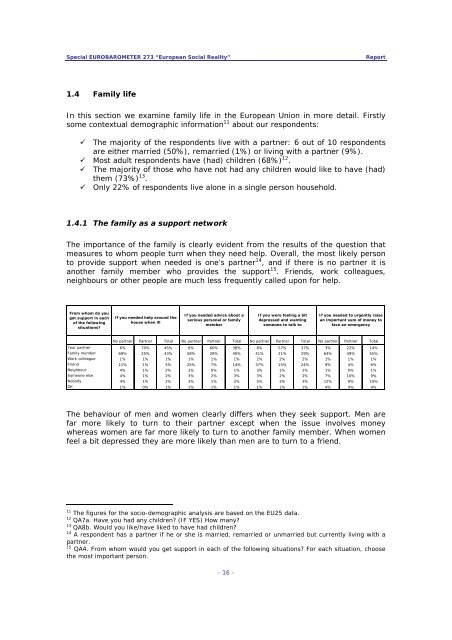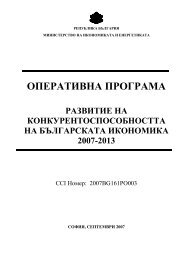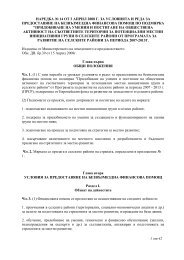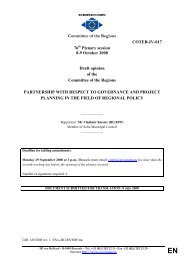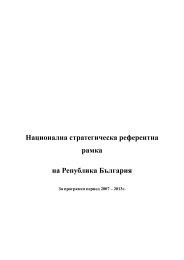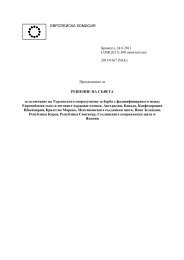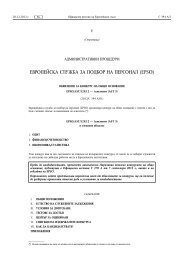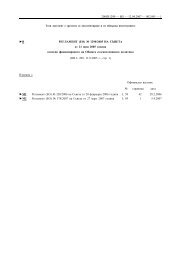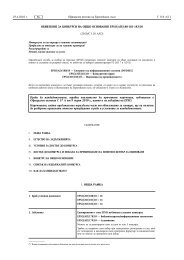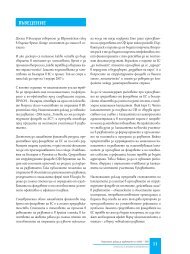Special Eurobarometer 'European social reality'
Special Eurobarometer 'European social reality'
Special Eurobarometer 'European social reality'
You also want an ePaper? Increase the reach of your titles
YUMPU automatically turns print PDFs into web optimized ePapers that Google loves.
<strong>Special</strong> EUROBAROMETER 273 “European Social Reality” Report<br />
1.4 Family life<br />
In this section we examine family life in the European Union in more detail. Firstly<br />
some contextual demographic information 11 about our respondents:<br />
The majority of the respondents live with a partner: 6 out of 10 respondents<br />
are either married (50%), remarried (1%) or living with a partner (9%).<br />
Most adult respondents have (had) children (68%) 12 .<br />
The majority of those who have not had any children would like to have (had)<br />
them (73%) 13 .<br />
Only 22% of respondents live alone in a single person household.<br />
1.4.1 The family as a support network<br />
The importance of the family is clearly evident from the results of the question that<br />
measures to whom people turn when they need help. Overall, the most likely person<br />
to provide support when needed is one’s partner 14 , and if there is no partner it is<br />
another family member who provides the support 15 . Friends, work colleagues,<br />
neighbours or other people are much less frequently called upon for help.<br />
From whom do you<br />
get support in each<br />
of the following<br />
situations?<br />
If you needed help around the<br />
house when ill<br />
If you needed advice about a<br />
serious personal or family<br />
member<br />
No partner Partner Total No partner Partner Total No partner Partner Total No partner Partner Total<br />
Your partner 6% 70% 45% 6% 60% 38% 8% 57% 37% 3% 22% 14%<br />
Family member 69% 25% 43% 58% 28% 40% 41% 21% 29% 64% 49% 55%<br />
Work colleague 1% 1% 1% 1% 1% 1% 2% 2% 2% 1% 1% 1%<br />
Friend 11% 1% 5% 25% 7% 14% 37% 15% 24% 9% 4% 6%<br />
Neighbour 4% 1% 2% 2% 0% 1% 3% 1% 2% 1% 0% 1%<br />
Someone else 4% 1% 2% 3% 2% 3% 3% 2% 2% 7% 10% 9%<br />
Nobody 4% 1% 2% 3% 1% 2% 5% 3% 3% 12% 9% 10%<br />
DK 1% 0% 1% 1% 1% 1% 1% 1% 1% 4% 4% 4%<br />
- 16 -<br />
If you were feeling a bit<br />
depressed and wanting<br />
someone to talk to<br />
If you needed to urgently raise<br />
an important sum of money to<br />
face an emergency<br />
The behaviour of men and women clearly differs when they seek support. Men are<br />
far more likely to turn to their partner except when the issue involves money<br />
whereas women are far more likely to turn to another family member. When women<br />
feel a bit depressed they are more likely than men are to turn to a friend.<br />
11<br />
The figures for the socio-demographic analysis are based on the EU25 data.<br />
12<br />
QA7a. Have you had any children? (IF YES) How many?<br />
13<br />
QA8b. Would you like/have liked to have had children?<br />
14<br />
A respondent has a partner if he or she is married, remarried or unmarried but currently living with a<br />
partner.<br />
15<br />
QA4. From whom would you get support in each of the following situations? For each situation, choose<br />
the most important person.


